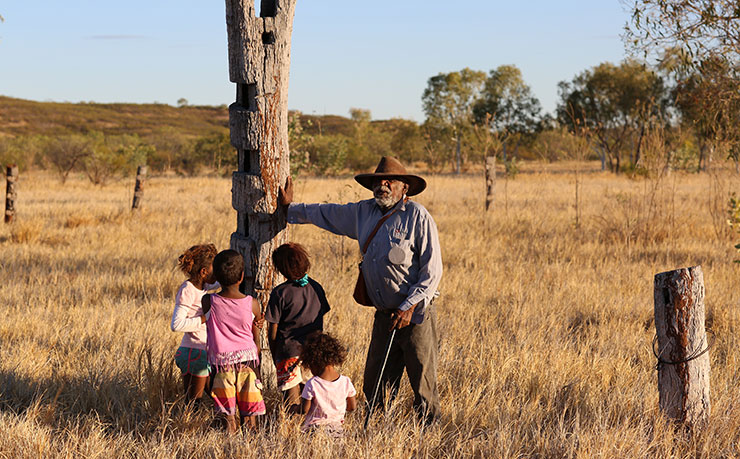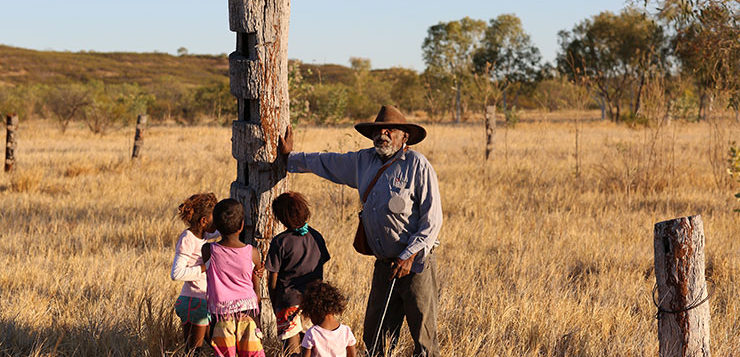DON’T MISS ANYTHING! ONE CLICK TO GET NEW MATILDA DELIVERED DIRECT TO YOUR INBOX, FREE!
The Gurindji community – and the entire nation – has lost one of the Top End’s great men. Kira Dandy, Jezebel Dandy, Erika Charola, Felicity Meakins and Brenda L. Croft pay tribute to a man whose knowledge and humility sustained and anchored his people.
The last weeks of May in other years invariably offer unrelenting sunshine, blue skies and strong breezes. But last Wednesday, Kalkaringi and Daguragu communities awoke to overcast skies, drizzle and the news that we had lost our most knowledgeable Gurindji elder, Ronnie Wavehill Jangala*.
His Dreaming was the Ngapa (Rain) Dreaming, and even school children who did not know this, commented that the sky was crying for the old man. The light rain and grey skies lasted for three days before normal weather resumed.
Australia has lost an intellectual giant. Ronnie Wavehill was born in 1936 at Wave Hill Station and passed away on 20 May on Gurindji country surrounded by the granddaughters he raised and their young families.
Like most Aboriginal men of his era in the Northern Territory, Ronnie worked in the cattle industry. He worked as a stockman on Wave Hill Station, notorious for working and living conditions so poor that the Gurindji walked off the station in 1966 demanding equal pay in a strike that later turned to land rights.
But Ronnie’s true legacy lies in his extraordinary talents in performative story-telling, his quick wit and his encyclopaedic memory. He was a powerful proponent of Gurindji language and culture. Ronnie didn’t start working with researchers until later in life, but a few years of collaborative work with other elders, linguists and other researchers resulted in several Gurindji language publications, an animation and environmental conservation resources. They are bilingual resources so not only Gurindji people, but the broader Australian community can benefit from his knowledge.
However, the language and culture research was only sporadic project work with a few hours of casual pay during the week, or a few weeks of full-time work during the year. A thinker of his calibre in another culture would be a professor at a university, or a renowned television personality.
But, symptomatic of the lack of opportunity for Indigenous talent in his time and place, or maybe with the absurdity of a Greek comedy, when Ronnie became a pensioner 20 years ago, he had been working emptying rubbish bins for the local council. But also typical of his philosophical attitude, he said he liked this work as he could banter with his good friend Oscar, as the two toured the community collecting rubbish.
In 1945, Ronald and Catherine Berndt reported on the inhumane living and work conditions Aboriginal people endured on Wave Hill Station. In ‘End of an Era’ (1987), they described Jangala as a small boy around the age of 10, already working as a stockman. What they didn’t know at the time was this small boy had already spent much of his early childhood travelling with his grandparents through Gurindji, and neighbouring Nyininy and Malngin country.

They travelled hundreds of kilometres on foot to follow the seasonal ceremony gatherings, connecting with country and countrymen.
It was on the return to Wave Hill after one of these trips to the west that Ronnie, the young boy, demonstrated his prodigious talent for songs, performing the Wanjiwanji (Laka) songs to a circle of grown men.
Wanjiwanji are now a little-remembered song tradition which extends from the Northern Territory to the southern coast of Western Australia and across to NSW. Ronnie documented these songs with linguists in a documentary, which aired on NITV in 2018, and in the book ‘Songs from the Stations’ (Sydney University Press 2019).
The time spent with older generations when he was young gave Ronnie a language proficiency and traditional knowledge typical of earlier generations that first came into contact with non-Indigenous people. The frontier history is very recent to Gurindji country.
Ronnie was an exceptionally talented teller of history as well as of Dreamtime stories. He said that it was important that young people know their culture, and that the history of the region, including massacres and other atrocities, be known by all Australians. He worked with linguists to document these stories in ‘Yijarni: True Stories from Gurindji Country’ (Aboriginal Studies Press, 2016) and ‘Mayarni-kari Yurrk: More stories from Gurindji Country (Batchelor Press, 2016).
Even though he was well-aware of past atrocities by Europeans, Ronnie did not generalise his opinion of their character failings to all kartiya (non-Indigenous). He often plainly said that there were bad kartiya and good kartiya, bad ngumpin (Aboriginal people) and good ngumpin. Ronnie was clearly one of the latter.
All who knew him attested to the fact that Ronnie was a rigorously principled, honest and humble man. He would readily admit that he did not know a particular detail of an event for example, rather than deflect the question or supply a non-answer. He would only speak for his own country unless he had the permission of the right traditional owner to share the relevant knowledge. Furthermore he steadfastly refrained from contributing to gossip or conflict in the day-to-day goings-on around him.
The Gurindji community knew Ronnie as a quick wit and comic. He could mercilessly take down someone who took themselves too seriously, interject a hilarious comment, or humorously tease a child in that age where they want to claim the best toys for themselves alone.
Sharing with the right people is fundamental in early childhood education the Gurindji way, as shown in Karu: Growing up Gurindji (Spinifex Press, 2019) and Ronnie was a brilliant educator. Poor eyesight in later life prevented him from participating in school activities or the card games where he often kept his friends and neighbours entertained.
Spending much of his early childhood in the care of his own grandparents, Ronnie also became the primary care-giver of two of his granddaughters. He fought vigorously to retain custody when the modern equivalent of ‘Welfare’ decided an elderly man could not be a fit guardian for young girls, but of course his intelligence and humanity made him an excellent parent, and having been removed to family members in other towns, his granddaughters nominated to return to him. They are deeply mourning the loss of the wisdom, knowledge and stability he brought to their lives.
While Ronnie knew the traditions inside out, he understood that the modern world also requires other skills. He insisted that both girls go to boarding school to continue their education (as Year 12 was not offered at the local school). They both achieved well at school and are now married. Their young families are packed into the small house he lived in so that they could look after him, and so he could be a grandfather to their young children.
His encyclopaedic mind and frank nature earned him the trust of fellow Gurindji people and of researchers for Land Councils. He was much sought after in Native Title proceedings and in Land Trust activities, because countrymen sometimes relied on him for details of Dreamings on Gurindji country and neighbouring areas.
In the aftermath of the massacres, missing descendants can mean missing knowledge for pockets all over the country.
Ronnie also worked extensively with linguists on a dictionary of his language, Gurindji, only one of several languages he spoke.
His passing is a great loss to the Gurindji community and the broader Australian community. He is survived by his siblings Biddy Wavehill and Steven Long, his granddaughters Kira and Jezebel Dandy, and their extensive families that together make up a large part of the Gurindji community.
*Inline with Gurindji traditions, Ronnie’s name is no longer spoken aloud, but the family has given permission for it to be written.
Donate To New Matilda
New Matilda is a small, independent media outlet. We survive through reader contributions, and never losing a lawsuit. If you got something from this article, giving something back helps us to continue speaking truth to power. Every little bit counts.




